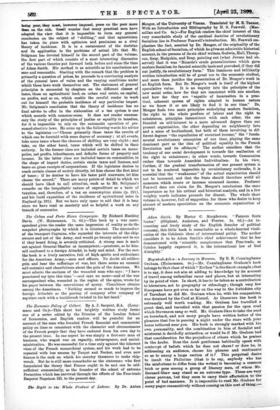The Right to the Whole Produce of labour. By Dr.
Anton Menger, of the University of Vienna. Translated by IL E. Tanner. With an Introduction and Bibliography by H. S. FoxwelL (Mao- millan and Co. 6s.)—For English readers the chief interest of this very remarkable study of the cardinal doctrine of revolutionary Socialism lies in Professor Foxwell's introduction. Mr. Foxwell em- phasises the fact, asserted by Dr. Menger, of the originality of the English school of Socialism, of which he gives an admirable historical account, in the persons of its six chief writers, Godwin, Hall, Thomp- son, Gray, Hodgakin, and Bray, pointing out (what Jevons had ob- served) that it was "Ricardo's crude generalisations which gave modern Socialism its fancied scientific basis and provoked, if they did not justify, its revolutionary form." This luminous and brilliantly written introduction will be of great use to the economic student, and more than justifies the presentation of Dr. Menger's work in an English form. But Dr. Menger's work is itself of the highest speculative value. It is an inquiry into the principles of the new social order, how far they are consistent with one another, and how far they are "capable of incarnation in a prac- tical, coherent system of rights adapted to human nature as we know it or are likely to find it in our time." Dr. Menger finds two main principles underlying modern Socialism, the right to the whole produce of labour and the right to subsistence, principles inconsistent with each other, the one founded on self-interest to a more advanced degree than our present organisation, the other depending on neighbourly love and a sense of brotherhood, but both of them involving in dif- ferent degrees "the repudiation of unearned income," the "funda- mental revolutionary conception of our time, playing the same dominant part as the idea of political equality in the French Revolution and its offshoots." The author considers that the tendency of our social development is towards the realisation of the right to subsistence ; in other words, towards Communism rather than towards Anarchist Individualism. In his view, further, if the gradual transformation of our present system is not to be rendered impossible by revolutionary outbreaks, it is essential that the " weaknesses " of the actual organisation should not be increased, and that the State should therefore avoid all measures which create or increase unearned income. Professor Foxwell does not claim for Dr. Menger's conclusions the same importance as for his critical and historical analysis, and in a few weighty words indicates grounds for dissent. The whole short volume is, however, full of suggestion for those who desire to keep abreast of modern speculation on the economic organisation of society.






































 Previous page
Previous page